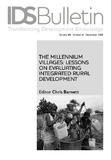Learning About Integrated Development Using Longitudinal Mixed Methods Programme Evaluation
| dc.contributor.author | Namey, Emily | |
| dc.contributor.author | Laumann, Lisa C. | |
| dc.contributor.author | Brown, Annette N. | |
| dc.coverage.spatial | Uganda | en |
| dc.date.accessioned | 2018-11-09T10:10:58Z | |
| dc.date.available | 2018-11-09T10:10:58Z | |
| dc.date.issued | 2018-09-30 | |
| dc.identifier.citation | Namey,E., Laumann, L.C. and Brown, A.N. (2018) 'Learning About Integrated Development Using Longitudinal Mixed Methods Programme Evaluation' in The Millennium Villages: Lessons on Evaluating Integrated Rural Development, IDS Bulletin 49.4, Brighton: IDS | en |
| dc.identifier.uri | https://opendocs.ids.ac.uk/opendocs/handle/20.500.12413/14111 | |
| dc.description.abstract | Globally, millions of children are living without parental care. Families experience multiple challenges that lead to family–child separation, with financial hardship a common theme. The integration of interventions to strengthen families socially, emotionally, and economically is therefore a priority, but requires knowing which combination(s) of interventions might work for which households. This article reflects on an ongoing evaluation of two projects in Uganda that implemented integrated family and economic strengthening interventions with families at risk of a child being separated and those where a separated child was reunited. We discuss how the practical realities of integrated programming influence research design options and our attempts to mitigate the potential limitations of a non‑experimental design with the use of a mixed methods approach. | en |
| dc.description.sponsorship | Department for International Development (DFID) | en |
| dc.language.iso | en | en |
| dc.publisher | Institute of Development Studies | en |
| dc.relation.ispartofseries | IDS Bulletin;49.4 | |
| dc.rights | This is an Open Access article distributed under the terms of the Creative Commons Attribution Non Commercial No Derivatives 4.0 International licence (CC BY-NC-ND), which permits use and distribution in any medium, provided the original authors and source are credited, the work is not used for commercial purposes, and no modifications or adaptations are made. https://creativecommons.org/licenses/by-nc-nd/4.0/legalcode | en |
| dc.rights.uri | http://creativecommons.org/licenses/by-nc-nd/4.0/ | en |
| dc.subject | Rural Development | en |
| dc.title | Learning About Integrated Development Using Longitudinal Mixed Methods Programme Evaluation | en |
| dc.type | Article | en |
| dc.rights.holder | Institute of Development Studies | en |
| dc.identifier.team | Rural Futures | en |
| dc.identifier.doi | 10.19088/1968-2018.164 | |
| dcterms.dateAccepted | 2018-09-30 | |
| rioxxterms.funder | Default funder | en |
| rioxxterms.identifier.project | Default project | en |
| rioxxterms.version | VoR | en |
| rioxxterms.funder.project | 9ce4e4dc-26e9-4d78-96e9-15e4dcac0642 | en |
Files in this item
This item appears in the following Collection(s)
Except where otherwise noted, this item's license is described as This is an Open Access article distributed under the terms of the Creative Commons Attribution Non Commercial No Derivatives 4.0 International licence (CC BY-NC-ND), which permits use and distribution in any medium, provided the original authors and source are credited, the work is not used for commercial purposes, and no modifications or adaptations are made. https://creativecommons.org/licenses/by-nc-nd/4.0/legalcode


